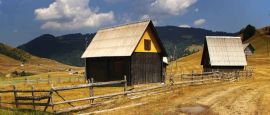Montenegro: Doing business & staying in touch
Doing business in Montenegro
Montenegrins value personal relationships in business. Initial meetings often focus on building trust rather than discussing specifics. Meetings may lack strict agendas and can include off-topic discussions, sometimes lasting several hours. Punctuality is appreciated, but it's common for meetings to start later than scheduled. A firm handshake is the standard greeting, and addressing individuals by their titles and surnames denotes respect.
Negotiations in Montenegro are often patient and deliberate. Building a personal connection is crucial before finalising deals. Bargaining is expected, and decisions may require time, as consensus among stakeholders is valued. Demonstrating commitment to a long-term partnership can be more effective than aggressive sales tactics.
Professional attire in Montenegro tends to be formal. Men are expected to wear suits, while women should opt for business suits or conservative dresses. During the summer months, attire may become slightly more casual, but maintaining a polished appearance is advisable.
Hospitality is a cornerstone of Montenegrin culture. It's customary for business meetings to extend to social settings, such as lunches or dinners. If invited to a colleague's home, bringing a small gift like fine wine or chocolates is appreciated. Sharing local food and drinks is a way to build rapport, and showing enthusiasm for Montenegrin cuisine can foster goodwill.
Montenegro's economy is primarily service-based, with tourism, energy, and agriculture as its key sectors.
Tourism plays a particularly vital role, contributing significantly to GDP, as the country's stunning Adriatic coastline and historic towns like Kotor and Budva attract visitors from around the world. The energy sector, especially hydropower, is also a cornerstone of Montenegro's economic landscape, with ongoing investments aimed at enhancing production capacities and infrastructure. Agriculture remains an important but smaller sector, with efforts focused on modernisation and improving productivity.
In recent years, Montenegro has experienced steady economic growth driven by tourism, private consumption, and infrastructure projects. Inflation and unemployment have fluctuated but have generally followed a downward trend as the country continues to stabilise and integrate with European markets. Public debt, which had previously been a concern, has been gradually reduced through fiscal reforms and economic expansion.
Despite these positive developments, Montenegro faces challenges such as economic diversification, reliance on imports, and political uncertainties. The country continues to work toward strengthening its export base and attracting foreign investment, particularly in sustainable tourism and renewable energy. The outlook remains optimistic, with ongoing infrastructure improvements and economic policies aimed at fostering long-term stability and growth.
Keeping in Touch in Montenegro
Montenegro has good mobile phone coverage, especially in urban areas and along the Adriatic coast. The primary mobile network providers are: MTEL (Telekom Montenegro), Telenor Montenegro, and One Crna Gora (formerly Telekom Crne Gore).
These providers offer 3G, 4G, and increasingly 5G services, with coverage extending to most towns and tourist destinations. However, remote mountain areas may have limited reception.
Travellers can purchase prepaid SIM cards at airports, mobile phone shops, supermarkets, and convenience stores. A passport is usually required for SIM card registration. SIM cards typically cost around €5-10, with options for data bundles and international calling packages.
Free Wi-Fi is widely available in hotels, restaurants, and cafés, making it easy to stay connected without relying on mobile data.
The national public broadcaster, Radio and Television of Montenegro (RTCG), operates several television and radio channels, offering news, entertainment, and cultural programming.
Private broadcasters such as Vijesti, TV Prva, and Nova M also play a significant role, providing news coverage, sports, and entertainment shows. Many international channels, including BBC, CNN, and Euronews, are available through cable and satellite services.
Leading newspapers in Montenegro include Vijesti (the most widely read daily newspaper, known for its independent reporting) and Pobjeda (the oldest newspaper in Montenegro, with a focus on current affairs).
The growth of digital media is significant, with many traditional media outlets maintaining online portals. Websites like vijesti.me, portalanalitika.me, and cdm.me provide up-to-date news, often available in Montenegrin and English. Social media is also widely used, with Facebook, Instagram, and Twitter being popular platforms for news and communication.
Montenegro's press freedom is generally respected, though the media landscape can be influenced by political affiliations and economic interests. According to Reporters Without Borders, the media environment is partly free, with occasional concerns about journalistic independence and the safety of journalists.








 You know where
You know where